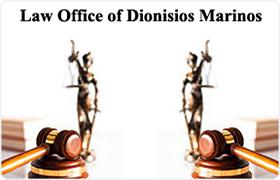Huntington Park Family Law Lawyer, California
Sponsored Law Firm
-
 x
x

Click For More Info:
-
Law Office of Dionisios Marinos
5150 E Pacific Coast Hwy Suite 200 Long Beach, CA 90804» view mapDivorce & Family Law Committed To Client Satisfaction
Don't hesitate to call the Law Office of Dionisios Marinos in Long Beach, CA. We are committed to your satisfaction. Call us today.
800-846-1250
Includes: Collaborative Law, Domestic Violence & Neglect, Paternity, Prenuptial Agreements
Leslie Walker Vanantwerp
Divorce & Family Law, Litigation, Family Law
Status: In Good Standing *Status is reviewed annually. For latest information visit here Licensed: 42 Years
Bradley Drew Hochberg
Personal Injury, Criminal, Family Law, Immigration
Status: In Good Standing *Status is reviewed annually. For latest information visit here Licensed: 32 Years
Henry Hernandez Gonzalez
Prenuptial Agreements, White Collar Crime, Contract, Commercial Bankruptcy
Status: In Good Standing *Status is reviewed annually. For latest information visit here Licensed: 25 Years
Shawnte Jamar Beam
Medical Malpractice, Contract, Family Law, Immigration, Litigation
Status: In Good Standing *Status is reviewed annually. For latest information visit here Licensed: 22 Years
Beatriz Alicia Pelayo
Criminal, Family Law, Dispute Resolution, Litigation
Status: In Good Standing *Status is reviewed annually. For latest information visit here Licensed: 21 Years
Beatriz A. Pelayo-Garcia
Criminal, Divorce & Family Law, Divorce, Prenuptial Agreements, Litigation
Status: In Good Standing *Status is reviewed annually. For latest information visit here
Ruben Fuentes
Personal Injury, Bankruptcy, Family Law, Trusts, Immigration
Status: In Good Standing *Status is reviewed annually. For latest information visit here Licensed: 16 Years
Brittany Megan Stringfellow Otey
Civil Rights, Family Law
Status: In Good Standing *Status is reviewed annually. For latest information visit here Licensed: 24 Years
Michael Arthur Guerrero
Business, Divorce & Family Law, Government, Family Law
Status: In Good Standing *Status is reviewed annually. For latest information visit here Licensed: 48 Years
Javier Arreola Lepe
Accident & Injury, Divorce & Family Law, Family Law
Status: In Good Standing *Status is reviewed annually. For latest information visit here Licensed: 23 Years
 Dionisios Marinos Long Beach, CA
Dionisios Marinos Long Beach, CA Practice AreasExpertise
Practice AreasExpertise